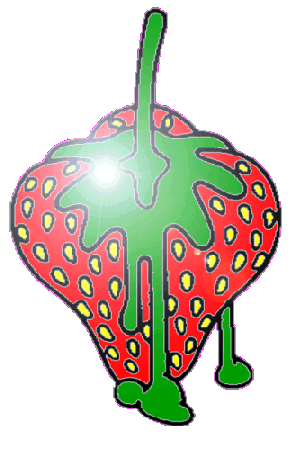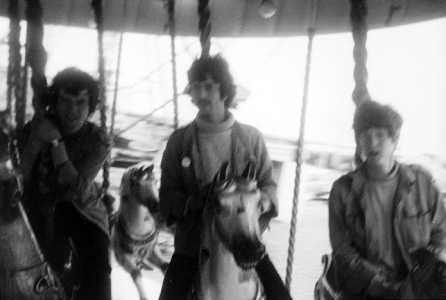
ALL FIRED UP!
Interview with Dave Lambert by Lindsay Sorrell - August 2007
Photographs and memorabilia from Dave Lambert's collection. Click on the display pictures to see a larger version.
 The 1960's undoubtedly heralded a fascinating era, as many raised in the aftermath of war began to challenge the confines of the establishment. Conformity began to yield to experimentation and a quest for alternative experiences and lifestyles, leading to many exciting and innovative developments, particularly noticeable in the arts. Simultaneously, fledgling industries such as the music business were largely unfettered by safe, homogenous marketing strategies concerned solely with profit margins. Within such a climate many musicians were afforded comparative freedom to unleash creativity and experiment with novelty, reflected in developments including the psychedelic movement. One innovative band of that genre which surfaced in West London was Fire, originally known as Friday's Chyld, the creation of Dave Lambert. Dave has recently announced his plans to stage two shows at The Windlesham Club and Theatre, Windlesham, Surrey on Friday 30th November and Saturday 1st December, during which, together with the other original members of Fire, he will be performing several of the band's classics including "Father's Name is Dad" and "Treacle Toffee World". Fire will also be performing their entire groundbreaking concept album "The Magic Shoemaker", now a highly valuable collectors' item, for the first time ever. During a recent discussion about numerous topics Dave spoke about the reformation of Fire, recounted fascinating memories of his early career, and revealed some of his musical inspirations and ambitions.
Though best known for his work with Strawbs, Dave's musical career had long been established by the time he joined them in 1972, and he was already well-acquainted with the twists and turns of the music business. Dave's career in music began with membership of various bands as a schoolboy, two of which were The Syndicate and Chains. Songwriting, too, began during Dave's school years; at the age of fourteen, while a member of Chains, he wrote his first songs: "Bye Bye Blues" and "Long Gone Baby" and cut his first demo. Dave considers his first creative song to have been "It's Not Easy Falling Out Of Love" however, which he wrote at the grand old age of sixteen (and a copy of which he recently found in his loft!).
The 1960's undoubtedly heralded a fascinating era, as many raised in the aftermath of war began to challenge the confines of the establishment. Conformity began to yield to experimentation and a quest for alternative experiences and lifestyles, leading to many exciting and innovative developments, particularly noticeable in the arts. Simultaneously, fledgling industries such as the music business were largely unfettered by safe, homogenous marketing strategies concerned solely with profit margins. Within such a climate many musicians were afforded comparative freedom to unleash creativity and experiment with novelty, reflected in developments including the psychedelic movement. One innovative band of that genre which surfaced in West London was Fire, originally known as Friday's Chyld, the creation of Dave Lambert. Dave has recently announced his plans to stage two shows at The Windlesham Club and Theatre, Windlesham, Surrey on Friday 30th November and Saturday 1st December, during which, together with the other original members of Fire, he will be performing several of the band's classics including "Father's Name is Dad" and "Treacle Toffee World". Fire will also be performing their entire groundbreaking concept album "The Magic Shoemaker", now a highly valuable collectors' item, for the first time ever. During a recent discussion about numerous topics Dave spoke about the reformation of Fire, recounted fascinating memories of his early career, and revealed some of his musical inspirations and ambitions.
Though best known for his work with Strawbs, Dave's musical career had long been established by the time he joined them in 1972, and he was already well-acquainted with the twists and turns of the music business. Dave's career in music began with membership of various bands as a schoolboy, two of which were The Syndicate and Chains. Songwriting, too, began during Dave's school years; at the age of fourteen, while a member of Chains, he wrote his first songs: "Bye Bye Blues" and "Long Gone Baby" and cut his first demo. Dave considers his first creative song to have been "It's Not Easy Falling Out Of Love" however, which he wrote at the grand old age of sixteen (and a copy of which he recently found in his loft!).
Shortly after leaving school, Dave and Bob Voice, a friend from Boys' Brigade, performed an impromptu concert as a duo. An accordionist booked to play at The White Bear, Hounslow failed to appear and following an explanatory telephone call from Bob, Dave sang and played guitar accompaniment to Bob's drumming. That evening provided the initial inspiration for Dave to form a band. However, for a while Dave no longer wanted to sing and a bass-playing vocalist was drafted in, soon to be replaced by Dick Dufall, whom Dave met when he and Bob went to his home to buy an amp. Dave spotted Dick's bass, invited him to join the band, and Friday's Chyld was born. Three-piece bands were at the time considered something of a daring concept, attempted by only a smattering of contemporaries such as the Big Three, yet Friday's Chyld (later to be rechristened Fire) always retained that format apart from the brief 1969-70 spell when Paul Brett joined. Following their first gig in late 1966, also at The White Bear, the band was soon being managed by local newspaper reporter Ray Hammond who was quick to recognise the band's potential.
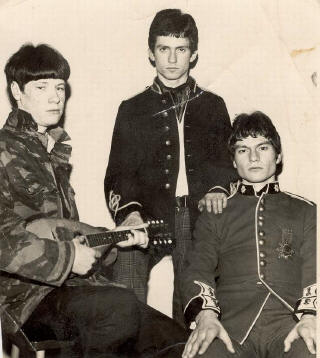 Many bands of the mid-60's had previously inspired Dave and he greatly admired several 2½ minute singles of the time, such as "Tobacco Road" by The Nashville Teens (on which, incidentally, Dave's eventual fellow Strawb John Hawken played keyboards). Dave's major early influences included Pink Floyd, Keith West's Tomorrow, Traffic and The Who. His early guitar heroes included Eddie Cochran, Buddy Holly, Hank Marvin; later heroes included Jimi Hendrix, whom he saw many times, and Peter Green, who continues to have a great impact upon him. Harbouring no desire to follow in others' footsteps, however, Dave sought an innovative direction for his own band. Following consultation with the other members, Friday's Chyld became Fire predominantly because the original name was considered somewhat "fey", while the new name better reflected the power of both Dave's musical compositions and the band's live performances. Greater potential impact could also be achieved in terms of graphics and marketing.
Many bands of the mid-60's had previously inspired Dave and he greatly admired several 2½ minute singles of the time, such as "Tobacco Road" by The Nashville Teens (on which, incidentally, Dave's eventual fellow Strawb John Hawken played keyboards). Dave's major early influences included Pink Floyd, Keith West's Tomorrow, Traffic and The Who. His early guitar heroes included Eddie Cochran, Buddy Holly, Hank Marvin; later heroes included Jimi Hendrix, whom he saw many times, and Peter Green, who continues to have a great impact upon him. Harbouring no desire to follow in others' footsteps, however, Dave sought an innovative direction for his own band. Following consultation with the other members, Friday's Chyld became Fire predominantly because the original name was considered somewhat "fey", while the new name better reflected the power of both Dave's musical compositions and the band's live performances. Greater potential impact could also be achieved in terms of graphics and marketing.
Though the name change occurred long before deals were struck with Apple and Decca, it also marked the distinction between the days in which the band played locally in the Hounslow area and their subsequent continuous travels around the UK playing to well-known "underground" circuit clubs including The Flamingo, The Temple, Middle Earth, The Marquee and The Roundhouse. Fire also played frequently to college and university crowds; around 1968 the band played at The Imperial College, Kensington every couple of weeks. As a support act, Fire frequently shared the bill with well-known bands such as Pink Floyd, Jethro Tull, The Moody Blues and Arthur Brown, and being very much a part of "happening" 1960's London the band had top fashion designers willingly gifting outfits for them to wear. "The Fool", through their connection with Apple, donated the band's stage clothes, while rival fashion designer Thea Porter donated a kaftan which Dave wore in several of Fire's publicity photographs (see below). Dave vividly remembers the occasion upon which Fire played in Paris during the 1968 riots; the streets were jampacked with people ripping up pavements and causing mayhem. The guy looking after the band at the time was known only to Dave as "Eddie"; Dave later discovered "Eddie" also possessed the title "Earl of Liverpool", however! Dave earned sufficiently lucratively to support himself throughout his time with Fire, combining residing at home with his parents and living in a flat in Chiswick. (In fact, Dave has only ever had one job unrelated to musicianship in his life; he has fond memories of working on the freight side of the Customs Department at Heathrow Airport, in an era when most staff there knew each other individually).
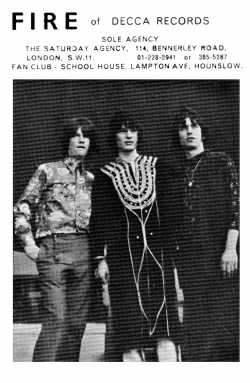 During his time with Fire Dave was not only responsible for the majority of the band's internal decision making, but also wrote and sang Fire's material in conjunction with playing guitar, piano, organ and percussion. His first taste of commercial success came with "Father's Name is Dad", a song he began writing while only seventeen. The single was released on Decca and benefited from the excellent production skills of the label's Tony Clarke, who was simultaneously producing The Moody Blues. The song, together with the track eventually released as the "B" side, "Treacle Toffee World", was used for Fire's initial audition to join Decca. An offer was forthcoming and accepted, but somewhat bizarrely "Father's Name is Dad" remained unreleased for many months; that decision was the first of several which were to affect Fire and continue to baffle Dave. Eventually released however, the single was soon withdrawn; Dave had signed an exclusive publishing contract with Apple and upon hearing the single on the radio, Paul McCartney decided the song should be re-recorded with various changes. This was duly done, but the anticipated impact did not occur. Fire continued to write and record prodigiously however, yet numerous further decisions made beyond the band's control led to increasing disenchantment with the workings of the music business. Much material which Dave and the other band members considered highly commercial remained unreleased, and Dave is at pains to point out that the "appalling" single entitled "Round the Gum Tree", released in late 1968 under the name of Fire, was not his song. In retrospect, Dave feels youthful naivety allowed him to be coerced into regrettable business decisions.
During his time with Fire Dave was not only responsible for the majority of the band's internal decision making, but also wrote and sang Fire's material in conjunction with playing guitar, piano, organ and percussion. His first taste of commercial success came with "Father's Name is Dad", a song he began writing while only seventeen. The single was released on Decca and benefited from the excellent production skills of the label's Tony Clarke, who was simultaneously producing The Moody Blues. The song, together with the track eventually released as the "B" side, "Treacle Toffee World", was used for Fire's initial audition to join Decca. An offer was forthcoming and accepted, but somewhat bizarrely "Father's Name is Dad" remained unreleased for many months; that decision was the first of several which were to affect Fire and continue to baffle Dave. Eventually released however, the single was soon withdrawn; Dave had signed an exclusive publishing contract with Apple and upon hearing the single on the radio, Paul McCartney decided the song should be re-recorded with various changes. This was duly done, but the anticipated impact did not occur. Fire continued to write and record prodigiously however, yet numerous further decisions made beyond the band's control led to increasing disenchantment with the workings of the music business. Much material which Dave and the other band members considered highly commercial remained unreleased, and Dave is at pains to point out that the "appalling" single entitled "Round the Gum Tree", released in late 1968 under the name of Fire, was not his song. In retrospect, Dave feels youthful naivety allowed him to be coerced into regrettable business decisions.
Undeterred by the lurking pitfalls of the music industry however, at the age of nineteen Dave single-handedly wrote a concept album which encapsulated the prevailing desire for musical experimentation. "The Magic Shoemaker" is now a rare collectors' item, and Dave has recently declared his intention, somewhat daringly, to stage two performances of the entire album, though such has never previously been attempted. Adding to the sense of occasion, Dave has managed to assemble his original former band mates, augmented by Paul Brett on electric guitar, just as on the original recording. Paul, as a former member of Elmer Gantry's Velvet Opera, was already known to Dave prior to his involvement in the recording of "The Magic Shoemaker"; he later assisted with guitar work in Fire and joined to play live shows for a period of about six months. Fellow member of Strawbs, Dave Cousins, added banjo to the original recording; though he and Dave knew each other socially at the time they had not previously played together. During the shows Ray Hammond, the aforementioned manager from Fire's early days, will take the narration part which Dave originally undertook.
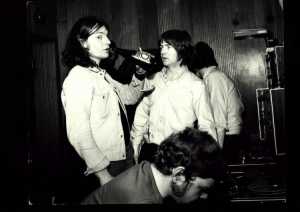 Dave's original idea for "The Magic Shoemaker" did not, in fact, involve a central character of a magic shoemaker, but rather a whole series of character studies. The opening lines of "The Winter and The Summer", a song well-known to Strawbs' fans from the "Bursting at the Seams" album: "Looks around with angel face, she does everything with amazing grace" were actually written with such studies in mind; a concept which Dave considers not yet to have been fully explored. Dave clearly has a fascination with the art of story-telling; he has recently been reading Dickens' "A Tale of Two Cities" and greatly enjoyed the characterisations written to involve more than one angle. Further in relation to story-telling, and in particular the plausibility of "truth", Dave described the native Indian method of verbal, rather than written, record-keeping of historic events. Many believe that such a method, and even rumours, may contain less bias and hence more "truth" than written accounts. The "magical" theme of the album was also undoubtedly influenced by Dave's own experiences; many "supernatural" occurrences have affected him during his life. Though Dave created several cameo characters while writing the story, the shoemaker unintentionally came to prominence and those familiar with "The Magic Shoemaker" will know that his name is "Mark". That may be considered a rather strange choice given the story's fairytale content; Dave has no idea why he chose "Mark", the name simply came to him "out of the blue". However, during recent investigations into his family tree Dave revealed he discovered several "Mark Lamberts", one of whom, born in 1815, had his profession slightly spookily listed as a "shoemaker".
Dave's original idea for "The Magic Shoemaker" did not, in fact, involve a central character of a magic shoemaker, but rather a whole series of character studies. The opening lines of "The Winter and The Summer", a song well-known to Strawbs' fans from the "Bursting at the Seams" album: "Looks around with angel face, she does everything with amazing grace" were actually written with such studies in mind; a concept which Dave considers not yet to have been fully explored. Dave clearly has a fascination with the art of story-telling; he has recently been reading Dickens' "A Tale of Two Cities" and greatly enjoyed the characterisations written to involve more than one angle. Further in relation to story-telling, and in particular the plausibility of "truth", Dave described the native Indian method of verbal, rather than written, record-keeping of historic events. Many believe that such a method, and even rumours, may contain less bias and hence more "truth" than written accounts. The "magical" theme of the album was also undoubtedly influenced by Dave's own experiences; many "supernatural" occurrences have affected him during his life. Though Dave created several cameo characters while writing the story, the shoemaker unintentionally came to prominence and those familiar with "The Magic Shoemaker" will know that his name is "Mark". That may be considered a rather strange choice given the story's fairytale content; Dave has no idea why he chose "Mark", the name simply came to him "out of the blue". However, during recent investigations into his family tree Dave revealed he discovered several "Mark Lamberts", one of whom, born in 1815, had his profession slightly spookily listed as a "shoemaker".
In common with many songs written during the psychedelic era, much of Dave's writing adopted the pure, untainted perspective of a child. Toni Arthur, former presenter of TV's Playschool, once asked Dave whether he had studied child psychology; he hasn't, but feels an intuitive affinity with the way children commonly perceive different situations. Illustrating this affinity, one of Dave's early songs, on which he played keyboards, was entitled "When Will I Understand the Things Grown-Ups Do?". The impression given on the album is that "The Magic Shoemaker" story is being read to a group of young children travelling by coach. This was not, however, Dave's idea; the recording actually occurred at a house in Walton-on-Thames (the engine sounds came from a music library and were overdubbed) where a party was thrown for the children, close relatives of the record producers. Dave had the task of attempting to entertain them with his story, which he had "cobbled" (his word, not mine!) together the prior evening. Financing such an album must have represented quite a gamble for Pye, the label upon which it was released, and would now be virtually unthinkable, yet Fire were actually given a substantial enough advance to replenish the band's instruments.
 The lengthy process of writing and recording the album took its toll on Dave however; even now listening evokes vivid memories of the intensity it involved. Dave spent approximately a year writing the album, followed by a month working all through each night recording demos. He found the experience confusing and disorientating, and considers he lost musical objectivity at the time. For two weeks after finishing recording he could not even bring himself to listen to the final mixes, eventually hearing them only when Ray Hammond brought them to his house in Hounslow.
The lengthy process of writing and recording the album took its toll on Dave however; even now listening evokes vivid memories of the intensity it involved. Dave spent approximately a year writing the album, followed by a month working all through each night recording demos. He found the experience confusing and disorientating, and considers he lost musical objectivity at the time. For two weeks after finishing recording he could not even bring himself to listen to the final mixes, eventually hearing them only when Ray Hammond brought them to his house in Hounslow.
However, Dave is thankfully now brimming with enthusiasm at the prospect of staging "The Magic Shoemaker". His prompt for undertaking such an ambitious project came while touring the States with Strawbs in 2006; a young guy in Upstate NY showed him a book entitled "The British Scene". Dave looked for Fire and was amazed to find a full-page photo and spread. He decided to stage a live performance of the band's innovative album, intending to gather musicians together to assist him. However, upon hearing of his plans, those involved in the original recording jumped at the idea of being part of the recreation of Fire, much to Dave's delight and astonishment! Though not nervous at the prospect of performing the album, Dave's main concern is how he will feel when the shows are over. The primary reason for two performances rather than one is to avoid the immense feeling of emptiness which a solitary performance would inevitably bring.
A considerable amount of hard work and dedication is involved in staging the shows; rehearsals involving the rhythm section, with Bob using an electric drum-kit, have been taking place approximately once a month since early 2007, and in the weeks immediately prior to the concerts rehearsals will intensify greatly. Bob has long been a highly successful comedy agent, handling many major acts, and until rehearsals commenced he had not played drums for thirty years. Dick, however, continued his professional bass-playing career and currently enjoys touring worldwide with a showband. Dave has been busy writing out each individual's part, and has also completely rewritten the script for Ray to narrate. Dave has never played a full drum-kit onstage before (though he has played a side-drum countless times with the Pride of Murray pipe-band), but intends to do so during the concerts. He will also play keyboards, and is currently practising as much as possible. (Dave finds keyboards inspirational for songwriting; he had been composing a song using a keyboard earlier in the day of our discussion. He also frequently uses keyboards on home-recordings made in his studio).
Each of the two shows will therefore give twenty-first century audiences an exceedingly rare opportunity to experience classic sounds from the psychedelic '60s, performed by their original creators, together with a rare chance to witness Dave Lambert's multi-instrumentalist talents. Thankfully, Dave is intending to record the shows for eventual CD release which will greatly please many who are able, or unable, to attend. Further details will become available at: the official Fire MySpace: www.myspace.com/2007fire, Dave's own MySpace: www.myspace.com/davelambert07, and on Strawbsweb.
To finish, conversation turned to various general topics briefly outlined here, such as what makes Dave's current playlist; he doesn't listen to much music though he greatly admires the work of Brian Wilson and enjoys watching the live Cream DVD from 2006. Dave also revealed a taste for classical music, particularly that of Beethoven and various British composers. He feels that, for him, lyrics are more important than music in some songs and vice versa in others; songwriters frequently cringe at their lyrics years after having penned them, but don't usually encounter the same problems when revisiting music. On being asked whether he considered any of his songs particularly special to him personally, Dave declared himself very proud of "Live Inside Your Hell Tonight" from his second solo album, "Work in Progress", and "The Winter and The Summer", from Strawbs' "Bursting at the Seams". Touching upon the difficulty singers frequently encounter in attempting to convey intended emotions when singing others' lyrics, Dave recounted that a girl had sent him a very good recording a few years' back of her own interpretation of that particular song. Dave explained how he frequently becomes bored with "standard" songwriting and constantly seeks new angles and influences with the intention of creating musical pictures. He enjoys experimenting with sounds, such as the rhythm of motorboat and railway engines, around which he constructs pieces of music. This approach to songwriting, Dave considers, is a further musical possibility not yet fully explored. One fascinating song Dave has recently written contains an argument; he doesn't expect to see such experimentation entering the realm of Strawbs' music however, and welcomes opportunities afforded through his solo work. Dave declared his approach to songwriting to be "non-commercial" with his own enjoyment at listening to his creations being crucial.
Many thanks, Dave, for a highly enjoyable and informative discussion.

